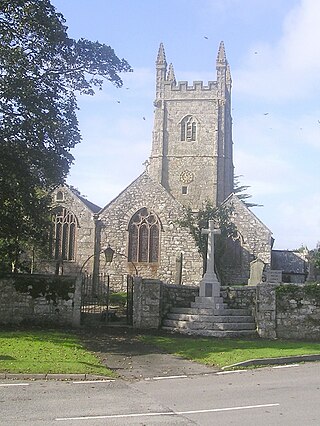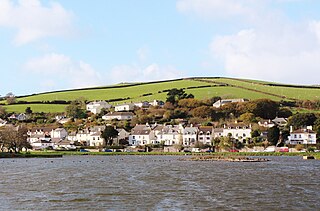This article needs additional citations for verification .(January 2021) |
The Lanner & District Silver Band is a brass band based in Lanner, Cornwall, United Kingdom, and an important part of village life.
This article needs additional citations for verification .(January 2021) |
The Lanner & District Silver Band is a brass band based in Lanner, Cornwall, United Kingdom, and an important part of village life.
The original Lanner & District Silver Band was formed in the Cornish village of Lanner in the mid-1890s. [1] However, following large-scale emigration from the mining district it disbanded in 1902.

The band was reformed in 1965, and in those early days practised in a chicken shed in the garden of Lanner resident Daisy Moyle. Mrs. Moyle later became the band's first 'Life Member'.
As the band attracted more members they outgrew the chicken shed and moved to a bandroom at the top of Lanner Hill. From these humble beginnings a strong youth band emerged, and as time went by these young players progressed into the senior band, thus helping to sustain its development. Eventually, even the Lanner Hill Bandroom became too small, and a concerted effort from the players and committee members resulted in the purchase, in 1983, of the old Primitive Methodist chapel on Lanner Moor, [1] which is the present band's headquarters.
Lanner & District Silver band has progressed from its early days in the fourth section of the Cornish and national ratings, and is today one of the finest bands in Cornwall (a county which has around 40 silver bands). It has represented the South West area at the National Finals and won many other contests throughout the south west. In April 2003 the band was crowned West of England 2nd Section Champions. This promoted the band to the 1st Section and gained them qualification to the National Brass Band Championships of Great Britain. The success continued later that year when, at the finals, the band achieved a magnificent 3rd place. Since that time the band has competed successfully in the First Section and will be proud to be competing in the Championship Section as of January 2014. The success continues and the Lanner Band is recognised as one of the most innovative, entertaining and successful bands in Cornwall.
In July 2013 the band successfully completed the building of its new Headquarters and recording facility, which can also be used as a community venue. Funded by the generous donation of a grant from the Sita Cornwall Trust, the building was completed with a huge amount of voluntary work by band members and committee.
The band plays at the head of the Lanner Carnival parade in July and the Remembrance Day parade in November, which march through the village every year along with Scouting groups, a number of village groups, and decorated floats.

Cornwall is a ceremonial county in South West England. It is recognised by Cornish and Celtic political groups as one of the Celtic nations, and is the homeland of the Cornish people. The county is bordered by the Atlantic Ocean to the north and west, Devon to the east, and the English Channel to the south. The largest urban area in the county is a conurbation that includes the former mining towns of Redruth and Camborne, and the county town is the city of Truro.

Redruth is a town and civil parish in Cornwall, England, United Kingdom. The population of Redruth was 14,018 at the 2011 census. In the same year the population of the Camborne-Redruth urban area, which also includes Carn Brea, Illogan and several outlying villages, stood at 55,400 making it the largest conurbation in Cornwall. Redruth lies approximately at the junction of the A393 and A3047 roads, on the route of the old London to Land's End trunk road, and is approximately 9 miles (14 km) west of Truro, 12 miles (19 km) east of St Ives, 18 miles (29 km) north east of Penzance and 11 miles (18 km) north west of Falmouth. Camborne and Redruth together form the largest urban area in Cornwall and before local government reorganisation were an urban district.

Camborne is a town in Cornwall, England. The population at the 2011 Census was 20,845. The northern edge of the parish includes a section of the South West Coast Path, Hell's Mouth and Deadman's Cove.

Helston is a town and civil parish in Cornwall, England, United Kingdom. It is situated at the northern end of the Lizard Peninsula approximately 12 miles (19 km) east of Penzance and 9 miles (14 km) south-west of Falmouth. Helston is the most southerly town on the island of Great Britain and is around 1.5 miles (2.4 km) farther south than Penzance. The population in 2011 was 11,700.
Cornwall is a Celtic nation with a long musical history. Strengthened by a series of 20th century revivals, traditional folk music has a popular following. It is accompanied by traditions of pipers, brass and silver bands, male voice choirs, classical, electronic and popular music.

Callington is a civil parish and town in east Cornwall, England, United Kingdom about 7 miles (11 km) north of Saltash and 9 miles (14 km) south of Launceston.

Carharrack is a civil parish and village in west Cornwall, England, United Kingdom. It is situated two miles (3 km) east of Redruth in a former mining area.

Gweek is a civil parish and village in Cornwall, England, United Kingdom. It is situated approximately three miles (5 km) east of Helston. The civil parish was created from part of the parish of Constantine by boundary revision in 1986. The name Gweek is first recorded as Gwyk in 1358 and is derived from the Cornish word gwig, meaning "forest village", cognate with the Welsh gwig and Old Breton guic. Gweek village has a pub, the Black Swan, and a combined shop and post office. The village is also home to the Cornish Seal Sanctuary.

The culture of Cornwall forms part of the culture of the United Kingdom, but has distinct customs, traditions and peculiarities. Cornwall has many strong local traditions. After many years of decline, Cornish culture has undergone a strong revival, and many groups exist to promote Cornwall's culture and language today.

Chacewater is a village and civil parish in Cornwall, England, UK. It is situated approximately 3 miles (4.8 km) east of Redruth. The hamlets of Carnhot, Cox Hill, Creegbrawse, Hale Mills, Jolly's Bottom, Salem, Saveock, Scorrier, Todpool, Twelveheads and Wheal Busy are in the parish. The electoral ward is called Chacewater & Kenwyn. At the 2011 census a population of 3,870 was quoted.

Stithians, also known as St Stythians, is a village and civil parish in Cornwall, England, United Kingdom. It lies in the middle of the triangle bounded by Redruth, Helston and Falmouth. Its population (2001) is 2,004, increasing to 2,101 at the 2011 census An electoral ward in the same name also exists but stretches north to St Day. The population here also at the 2011 census was 5,023.

Millbrook is a civil parish and village in southeast Cornwall, England, United Kingdom. The village is situated on the Rame Peninsula four miles (6.5 km) south of Saltash. The population of Millbrook was 2,033 in the 2001 census, increasing to 2,214 at the 2011 census.

St Day is a civil parish and village in Cornwall, England, United Kingdom. It is positioned between the village of Chacewater and the town of Redruth. The electoral ward St Day and Lanner had a population of 4,473 according to the 2011 census.

Mining in Cornwall and Devon, in the southwest of Britain, is thought to have begun in the early-middle Bronze Age with the exploitation of cassiterite. Tin, and later copper, were the most commonly extracted metals. Some tin mining continued long after the mining of other metals had become unprofitable, but ended in the late 20th century. In 2021, it was announced that a new mine was extracting battery-grade lithium carbonate, more than 20 years after the closure of the last South Crofty tin mine in Cornwall in 1998.

The Cornish diaspora consists of Cornish people and their descendants who emigrated from Cornwall, United Kingdom. The diaspora is found within the United Kingdom, and in countries such as the United States, Canada, Mexico, Panama, Colombia, Peru, Chile, Argentina, Brazil, South Africa, Australia, New Zealand, and the Samoas.

St Dennis is a civil parish and village in Cornwall, England, United Kingdom. The village is situated on the B3279 between Newquay and St Austell.

Lanner is a village and civil parish in west Cornwall, England, United Kingdom. It is situated on the A393 about 2 miles (3.2 km) south-east of Redruth.

Wendron is a village and civil parish in Cornwall, England, United Kingdom. It is approximately 3 miles (5 km) to the north of Helston and 6 miles (10 km) to the west of Penryn. The parish population at the 2011 census was 2,743. The electoral ward of Wendron had a 2011 population of 4,936.

Mineral del Monte, commonly called Real del Monte or El Real, is a small mining town, and one of the 84 municipalities of Hidalgo, in the State of Hidalgo in east-central Mexico.
Helston Town Band is a brass band in the Cornish town of Helston.